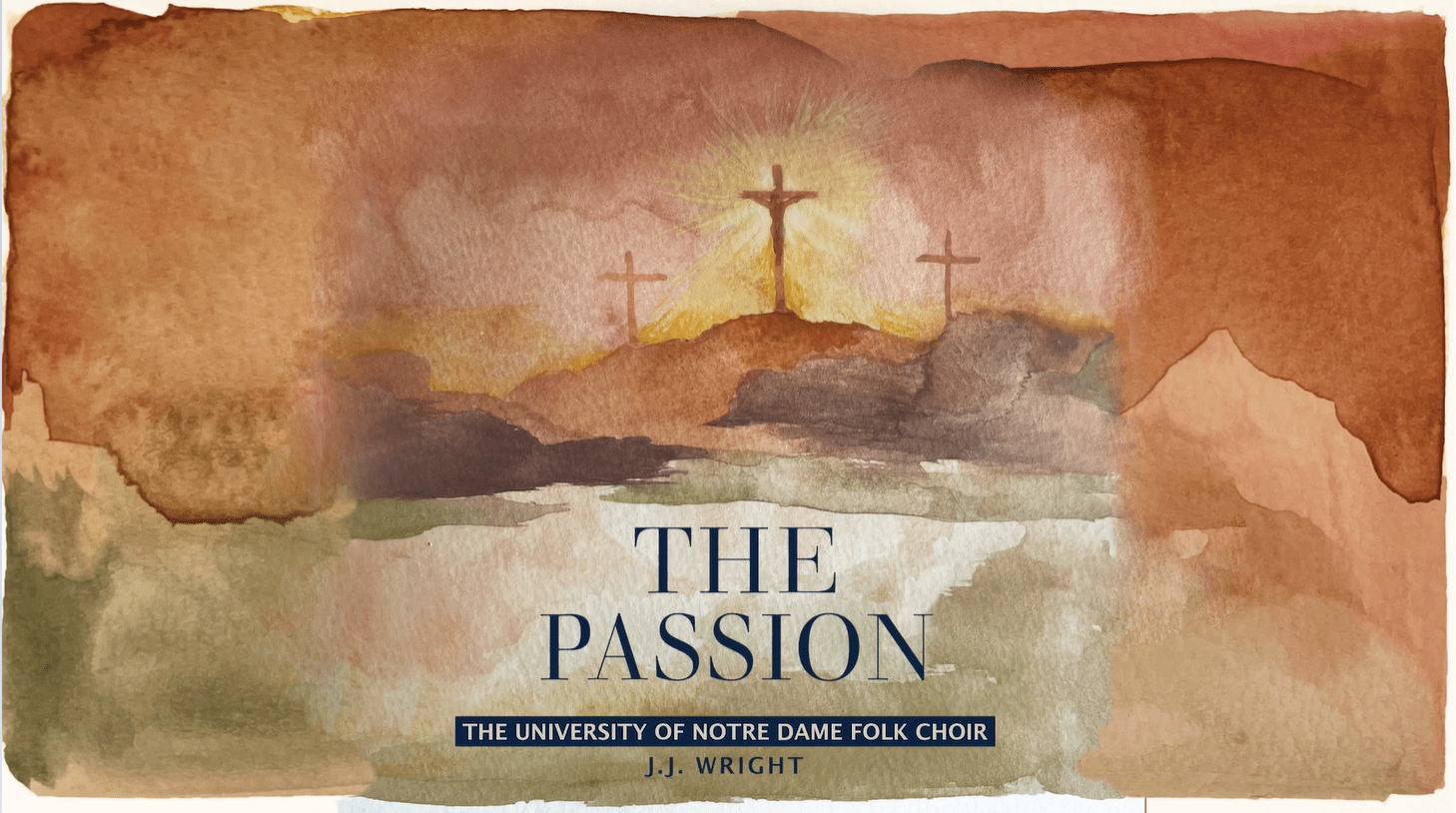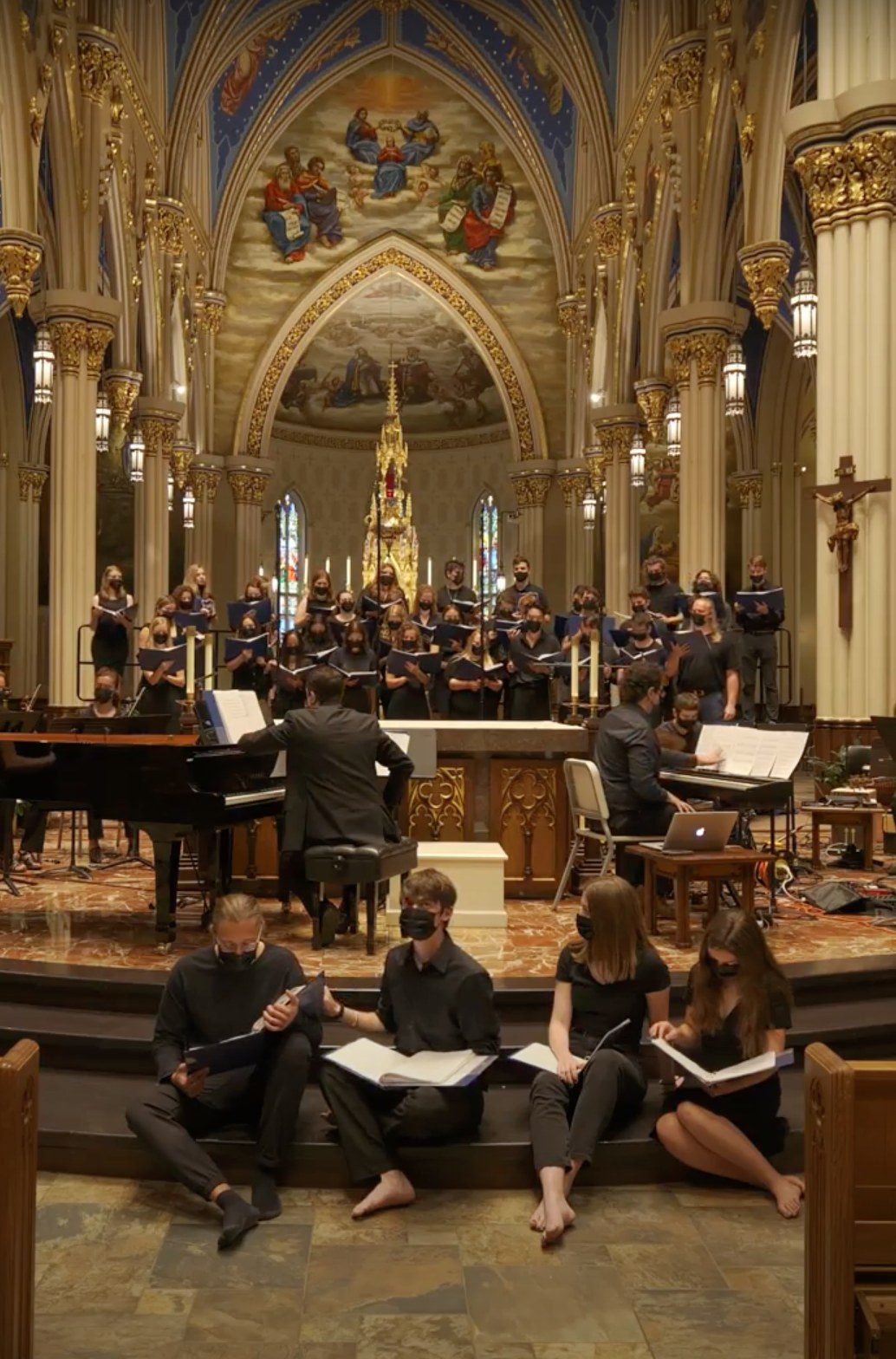The Way of the Cross: A Passion Pilgrimage Through Song – The Making of The Passion
Subscribe to the ThinkND podcast on Apple, Spotify, or Google.
Featured Speakers:
- J.J. Wright, Director, Notre Dame Folk Choir
- Kim Belcher, Professor in the Department of Theology, University of Notre Dame
- Anna Staud, Senior, Co-President of the Notre Dame Folk Choir, and Assistant Stage Director of The Passion
- Noelle Dorvault, First-year member of the Notre Dame Folk Choir
The first virtual event in the Notre Dame Folk Choir’s The Way of the Cross series explored the early stages and development of the Folk Choir’s recent Passion performance. This event was moderated by J.J. Wright, Director of the Notre Dame Folk Choir. Wright spoke with three other collaborators on the Passion project: Kim Belcher, Professor in the Department of Theology at the University of Notre Dame; Anna Staud, senior and co-president of the Notre Dame Folk Choir and the Assistant Stage Director of The Passion; and Noelle Dorvault, first-year member of the Notre Dame Folk Choir. This discussion began with a formal walkthrough of the making of The Passion among Wright, Belcher, Staud, and Dorvault, followed by an opportunity for questions and answers from viewers.
Wright began the event by returning to the conception of the Folk Choir’s Passion, which began in a time dominated by news headlines covering the beginnings of COVID-19, the clergy sexual abuse crisis, and race demonstations after the murder of George Floyd. In creating The Passion, Wright and the Folk Choir hoped to build an environment where students could talk about the hard things, dubbed the “wicked problems,” during their most formative years while the world was dealing with so much suffering. With The Passion’s themes of betrayal, unwillingness to speak up, and limited support for the vulnerable, Wright found that it was “pretty easy to see the parallels” in the modern world. During difficult times, students should turn toward their peers and toward God to understand their suffering, rather than backing away from the challenges around them. The goal of The Passion is to create a space for reflection and encouragement to place oneself in the Passion, to understand it more fully, and to turn to one’s community for support.
Next, the speakers outlined the structure of the piece and why music was a natural choice in retelling the Passion story. Wright explained that by becoming “co-creators in something that [one is] trying to become more of,” one can learn the words fully and work toward a bigger, shared goal. In the Folk Choir’s case, that meant using their talents to turn their bodies into art, creating music and insights to better understand the Passion. The 90-minute performance tells the story of the days leading up to and including Jesus’ crucifixion and death. Narrated by an Evangelist figure called Memory, John the Evangelist and Mary Magdalene in the Upper Room on Holy Saturday, and supported by an Apostle’s chorus, full chorus, and a band, the performance unearths the importance of memory – how it shaped the Apostles’ identities then and how it shapes our identities as Christians today.
For the remainder of the event, the speakers unpacked the development of the Folk Choir’s The Passion. With COVID-19 temporarily suspending many of the joys of Mass, including singing and community, many members of the choir were left searching for a creative and spiritual outlet. This project allowed them to channel their frustration with global and spiritual suffering through music. Using the Gospels and other Scripture as guidance, a small group of musicians, theologians, and students reflected individually and collectively to examine how the Apostles felt following Christ’s crucifixion. The process started with free-writing on Scripture, moved into writing dialogues between characters in the form of a Libretto, and eventually became a scene with words spoken and sung as the Apostles tried to comprehend the events unfolding before them in the Passion. After the work was fairly complete, even more members of the Folk Choir were able to collaborate together and remain in touch with music, their faith, and each other — even during socially distanced times.
To conclude the event, the speakers pointed toward future episodes in the series, notably the next event during which several members of the Folk Choir would discuss the wicked problems currently plaguing the world and how understanding the Passion can guide Christians in handling their struggles, taking responsibility, and moving forward as better people.
- With the Passion’s themes of betrayal, unwillingness to speak up, and limited support for the vulnerable, it is “pretty easy to see the parallels” from the Passion in the wicked problems existing in the modern world, 7:17.
- With COVID-19 temporarily suspending many of the joys of Mass, including singing and community, many members of the Folk Choir were left searching for a creative and spiritual outlet, a void that was soon filled with The Passion project, 17:30.
- “To truly mourn Christ, you don’t have to be a perfect Christian. You can have these lapses in unfaithfulness, and that doesn’t mean that you can’t be a part of [the Passion],” 36:41.
- The Passion serves as a template to better understand one’s own faults, share them in an intergenerational environment, and learn from them. While all Christians may not be able to understand each others’ realities, they can find connection through the Passion, 45:27.
- Despite memory often being faulty, it became the muse of this piece because of “memory being a lived experience critical to [one’s] identities.” When Christians are called to reflect during Mass on the Apostles’ experience during the Passion, “Do this in memory of me” takes on a different meaning, 55:30.
- “One of the incredible things about the Passion [and] about the Christian faith is that we’re constantly invited back into this conversation with Jesus, with God, to understand who we really are, and try to figure out the ways that we can become who we want to become.” — J.J. Wright, 8:10
- “[The Passion] takes place on Holy Saturday, and the disciples are remembering the life and death of Jesus, their friend, in the Upper Room, so they’re scared, they’re communally grieving and remembering for the first time, and they’re in this liminal space between death and resurrection.” — Anna Staud, 11:50
- “I got to identify with the disciples in the garden, who were questioning and tired and exhausted, and just utterly confused, that their friend, who they saw transfigured in glory was now sweating blood in the garden, and in utter agony.” — Anna Staud, 18:18
- “I was right in the middle… of a project working on how to use ritual and liturgy to help people recover from crisis. One of the things that we see when we look at people who are suffering from trauma, or, I would say, in the case of the sexual abuse crisis, a whole church that’s suffering from trauma or a whole population suffering from trauma in the wake of COVID lockdowns and the demonstrations in 2020, is that we see the need to engage in the things that symbolize for us what’s been really difficult, but that allows us to engage with that challenge in a way that gives us some agency [and] some power.” — Kim Belcher, 32:15
- “Students who weren’t necessarily part of the active writing can take what we’ve created, reflect on it and apply it, and actually get something really meaningful out of it … to truly mourn Christ, you don’t have to be a perfect Christian. You can have these lapses in unfaithfulness, and that doesn’t mean that you can’t be a part of [the Passion].” — Noelle Dorvault, 36:41
- “You just need one other person that’s willing to take [a big problem] on with you, and all of a sudden, what seemed like it was impossible is not just possible, it’s already happening. To me it was just so energizing to realize that you’re not alone working on these problems. And that I think is one of the things that’s so powerful about talking about these problems: that you don’t want to talk about them because it feels like there’s no way out, but as soon as you begin talking about them, you realize somebody’s already found a thread of a way out.” — Kim Belcher, 47:15
Related Content
The Passion – Live from the University of Notre Dame on Good Friday
Join the University of Notre Dame Folk Choir on Good Friday for their performance of The Passion, an original musical setting of the events of Christ’s passion. This 95-minute,...
View EventThe Way of the Cross: A Passion Pilgrimage Through Song
Led by Grammy® Award winner and Director of the Notre Dame Folk Choir Dr. J.J. Wright, this series will introduce The Passion, a new artistic production combining Scripture with...
View TakeawaysLenten Music Through the Ages
Get ready to embark on your own journey to Italy. This lecture invites you into the world of sacred music and how artistic, religious, and intellectual communities in Rome helped...
View Takeaways


